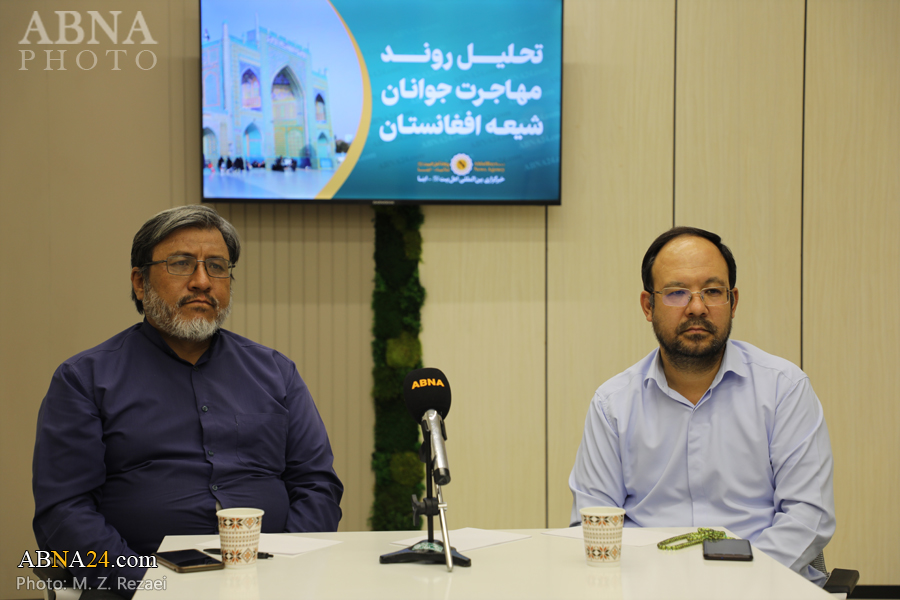“Analysis of the Migration Trend of Afghan Shiite Youth”, ABNA News Agency
The meeting “Analysis of the Migration Trend of Afghan Shiite Youth” was held with the participation of Dr. Amanullah Fasihi and Dr. Mohammad Juma Amini in the ABNA News Agency Meeting Hall.
ABWA Official Website – The meeting “Analysis of the Migration Trend of Afghan Shiite Youth” was held with the participation of experts in the ABNA News Agency Meeting Hall.

In this meeting, Dr. Amanullah Fasihi, a university professor and cultural expert, and Dr. Mohammad Juma Amini, a researcher and expert in the field of migration, discussed the issue of migration of Afghan Shiite youth in the last three years, after the change of government in Afghanistan. They also spoke about the challenges and harms of this migration for Afghanistan’s Shiite youth and elite.
First, Amini spoke about the prominent role of Afghans, those educated in Iran, in 20 years of the Afghan Republic. “The change of government in Afghanistan in 2021 will set the country's Shiites back perhaps 100 years. Everything has started from scratch for Afghanistan’s Shiites,” he said.
“During the 20 years of the Republic of Afghanistan, reverse migration occurred, and many refugees returned to the country,” he continued, “After the events of 2021, this trend changed dramatically and the number of our migrants in all countries of the world doubled. Another difference between migration from Afghanistan in the recent period and previous periods is that in the latter migrants were mainly highly educated. So, both in terms of number and quality, our immigrants have become very different immigrants.”
Further in the meeting, Fasihi said that the difference between the migration of Afghan Shiite youth in the last three years and the previous periods was that this migration was not optional for the Shiite elite of Afghanistan. “In previous times, the person left Afghanistan because of problems that arose. But in recent years, refugees have been largely driven out of Afghanistan.”
“During the reign of the Afghanistan Republic, Shiites gained extensive experience in executive and governance affairs by entering the country’s governance structure. After the change of government in the country, the Shiite elite was either dismissed or emigrated, which was a sad event. The workforce, which was trained for 20 years, was suddenly lost, and it is difficult to replace them,” Fasihi added.
“One of the dangerous consequences of Afghanistan’s Shiite migration is the evacuation of the country’s Shiite areas of indigenous people. Unfortunately, following the example of the elite who left the country, the general public also sold their homes and properties and migrated, leading to a territorial evacuation,” the Afghan scholar said.
In the final part of the meeting, Amini, an expert in the field of immigration, noted, “Governments view the immigrant differently. Some see immigrants as an opportunity and others as a threat. But we need to have a scientific look at the issue, view it from different dimensions, and refrain from looking at the phenomenon of migration as purely security or purely economic. We must know it as a political, economic, social, and cultural phenomenon.”
**************
End/ 345
The meeting “Analysis of the Migration Trend of Afghan Shiite Youth” was held with the participation of Dr. Amanullah Fasihi and Dr. Mohammad Juma Amini in the ABNA News Agency Meeting Hall.
ABWA Official Website – The meeting “Analysis of the Migration Trend of Afghan Shiite Youth” was held with the participation of experts in the ABNA News Agency Meeting Hall.

In this meeting, Dr. Amanullah Fasihi, a university professor and cultural expert, and Dr. Mohammad Juma Amini, a researcher and expert in the field of migration, discussed the issue of migration of Afghan Shiite youth in the last three years, after the change of government in Afghanistan. They also spoke about the challenges and harms of this migration for Afghanistan’s Shiite youth and elite.
First, Amini spoke about the prominent role of Afghans, those educated in Iran, in 20 years of the Afghan Republic. “The change of government in Afghanistan in 2021 will set the country's Shiites back perhaps 100 years. Everything has started from scratch for Afghanistan’s Shiites,” he said.
“During the 20 years of the Republic of Afghanistan, reverse migration occurred, and many refugees returned to the country,” he continued, “After the events of 2021, this trend changed dramatically and the number of our migrants in all countries of the world doubled. Another difference between migration from Afghanistan in the recent period and previous periods is that in the latter migrants were mainly highly educated. So, both in terms of number and quality, our immigrants have become very different immigrants.”
Further in the meeting, Fasihi said that the difference between the migration of Afghan Shiite youth in the last three years and the previous periods was that this migration was not optional for the Shiite elite of Afghanistan. “In previous times, the person left Afghanistan because of problems that arose. But in recent years, refugees have been largely driven out of Afghanistan.”
“During the reign of the Afghanistan Republic, Shiites gained extensive experience in executive and governance affairs by entering the country’s governance structure. After the change of government in the country, the Shiite elite was either dismissed or emigrated, which was a sad event. The workforce, which was trained for 20 years, was suddenly lost, and it is difficult to replace them,” Fasihi added.
“One of the dangerous consequences of Afghanistan’s Shiite migration is the evacuation of the country’s Shiite areas of indigenous people. Unfortunately, following the example of the elite who left the country, the general public also sold their homes and properties and migrated, leading to a territorial evacuation,” the Afghan scholar said.
In the final part of the meeting, Amini, an expert in the field of immigration, noted, “Governments view the immigrant differently. Some see immigrants as an opportunity and others as a threat. But we need to have a scientific look at the issue, view it from different dimensions, and refrain from looking at the phenomenon of migration as purely security or purely economic. We must know it as a political, economic, social, and cultural phenomenon.”
**************
End/ 345





